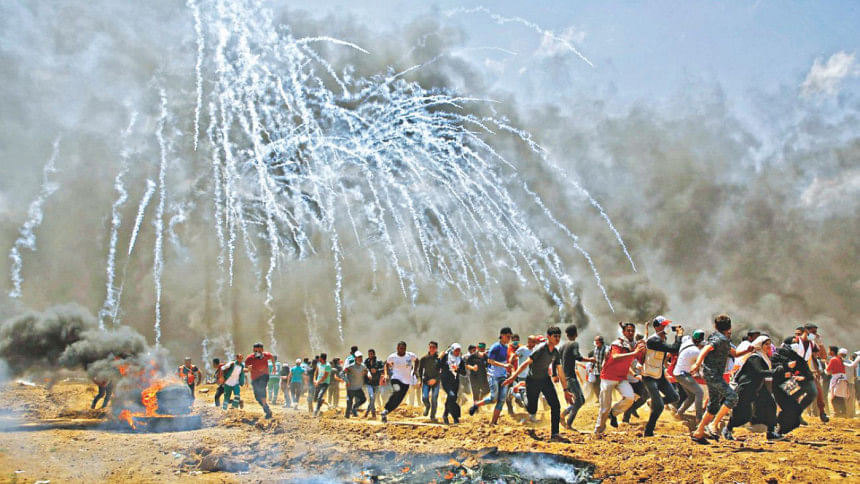An effective shelving of the two-state solution

With the death toll mounting to 58 last Monday thanks largely to a trigger-happy Israeli military and smiles all around Tel Aviv and Washington the two-state solution is all but dead and buried. When President Trump decided to move the US embassy from Tel Aviv to Jerusalem, all pretence of a negotiated settlement was effectively thrown out the window and what is happening in Gaza today points to a mindset that revolves around disenfranchising the Palestinians once and for all—through a feat of arms. The right of Palestinians to return to their homeland has been met by a hail of bullets by a regime that has the full support of the US administration.
Indeed, White House spokesman Raj Shah had this to say about the tragedy along Gaza Strip's eastern border: "We believe that Hamas is responsible for these tragic deaths, that their rather cynical exploitation of the situation is what's leading to these deaths, and we want them to stop." The deliberate skirting of Israeli strong-arm tactics speaks volumes about Washington's tacit approval of Tel Aviv actions. Although the Kuwaitis have asked for a discussion at the UN Security Council over the spiralling violence, the UN has done little beyond urging the Israelis to not use live fire.
While the Trump administration continues to harp on about a "strong commitment to peace", the decision to move the embassy to Jerusalem on May 14, which coincides with the 70th anniversary of "Nakba" or what the Palestinians call "catastrophe"—the expulsion of 85 to 90 percent of Palestinians over a two-year period and the destruction of hundreds of villages in 1948—is a strong message to the rest of the world about where Washington's strategic interests lie. The fact that the embassy move comes so recently after the Iran nuclear deal was scrapped point to a bleak future for peace in Palestine, and the region for that matter.
If it was the intention of the Trump administration to coerce the Palestinians to the negotiating table through this action, i.e. either to accept a peace treaty on Israeli terms or to face death or humiliation, then history will testify to an opposite conclusion. Palestinians have faced occupation, shootings, and discrimination for decades and the only thing that policy has done is push them into the arms of Hamas and breed new generations of young people willing to accept martyrdom. For a country that flaunt its so called democratic credentials, Israel under the stewardship of Prime Minister Netanyahu has resorted to blatant disregard for human life as demonstrators have been mowed down with live ammunition.
The failure to put up a collective protest by countries in the Middle East is primarily because of the deep divide between the Sunni and Shia blocs led by Saudi Arabia and Iran. In the greater scheme of things, the Palestine issue has largely fallen off the grid as these two powers square off one against the other in proxy wars that have rocked the region for years—from Syria to Yemen. None of this, of course, is lost on the State of Israel, which now with the support of the US administration, feels emboldened enough to blockade Gaza, its two million citizens, and treat them with extreme prejudice. That Israel feels well within its rights to use its vastly superior military force to pin down a civilian populace armed with slingshots and shelve the idea of a two-state solution for a peaceful settlement is the greatest tragedy of modern times.
Contrary to what Washington may state, the status of Jerusalem remains an unresolved issue. However, now that Jerusalem has been "recognised" as the capital of Israel by the US, we wonder what is to become of the 300,000 Palestinians living in the eastern part of the city. Will they still have rights to their land and property or are they to be expelled from the city or, in the worst case scenario, quarantined? It is still too early to jump to a conclusion, but for all that the world has had to witness these past few weeks, Israel has all but destroyed the hope for two states living side by side in peace.
Syed Mansur Hashim is Assistant Editor, The Daily Star.










Comments